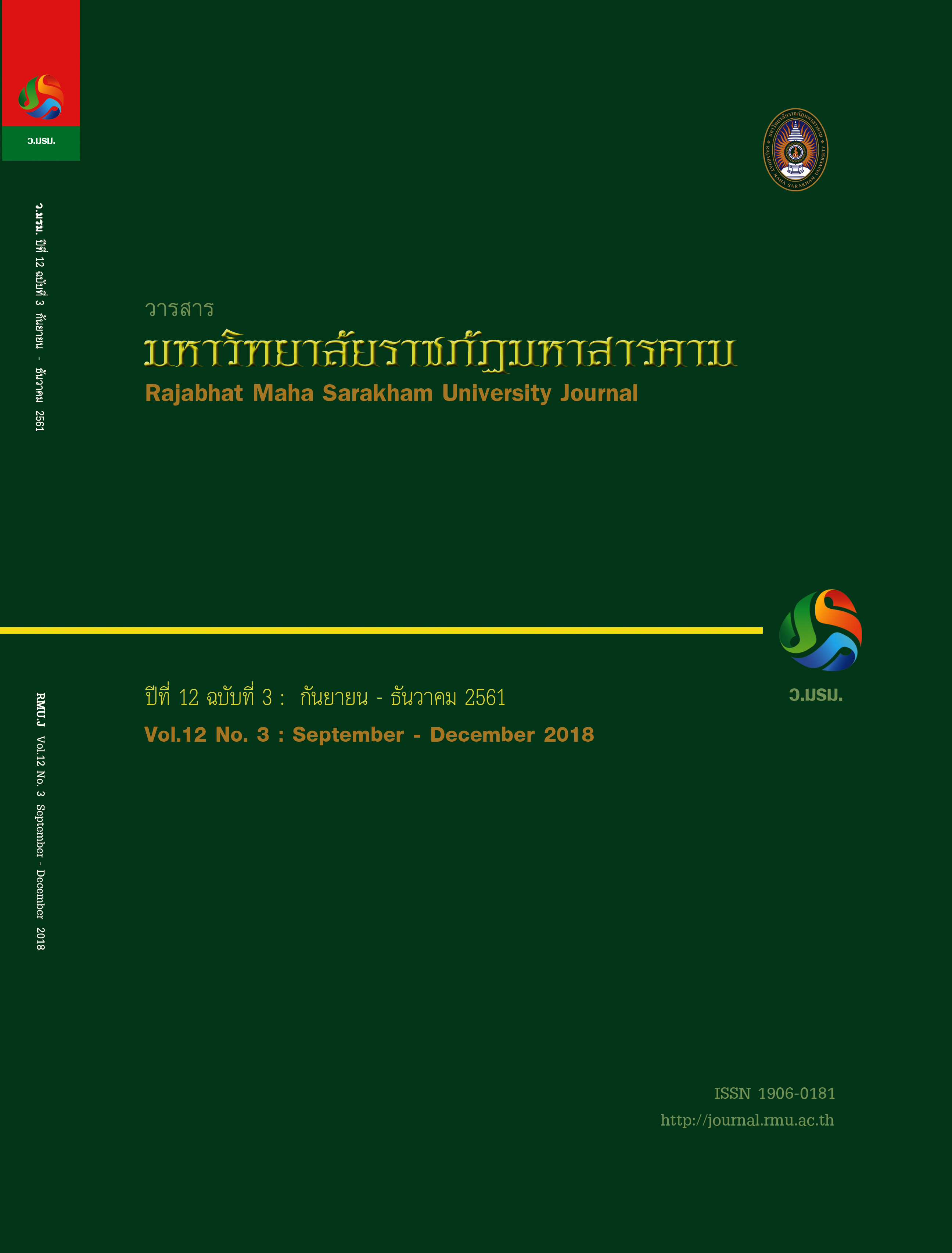ปัญญาภายในกับการสร้างจิตสำนึกรักและศรัทธาต่อวิชาชีพครู
Main Article Content
บทคัดย่อ
การวิจัยครั้งนี้มีวัตถุประสงค์เพื่อ 1) สร้างจิตสำนึกรักและศรัทธาต่อวิชาชีพครูสำหรับนักศึกษาครู 2) ให้นักศึกษาครูเกิดหลักการ
คิดแบบปัญญาภายใน 3) ให้นักศึกษาครูเกิดคุณลักษณะการเป็นครูที่ดี และ 4) เปรียบเทียบปัญญาภายในของนักศึกษาครูก่อนและ
หลังเข้าร่วมกิจกรรมสร้างจิตสำนึกรักและศรัทธาต่อวิชาชีพครู โดยใช้รูปแบบการวิจัยแบบผสานวิธี กลุ่มตัวอย่าง ได้แก่ นักศึกษาชั้น
ปีที่ 1 สาขาจิตวิทยาการปรึกษาและการแนะแนว-คอมพิวเตอร์ศึกษา ได้มาโดยวิธีสมัครใจ (Volunteer) จำนวน 16 คน เครื่องมือที่
ใช้ในการวิจัย ได้แก่ 1) กิจกรรมสร้างจิตสำนึกรักและศรัทธาต่อวิชาชีพครู 2) แบบรายงานตนเองที่เป็นแบบบันทึกประจำวัน และ 3)
แบบวัดปัญญา การวิเคราะห์ข้อมูลใช้การวิเคราะห์เชิงพรรณนาจากการตอบคำถาม (Content Analysis) ร่วมกับการวิเคราะห์ทางสถิติ
t-test (Dependent Samples) ค่าเฉลี่ย ค่าส่วนเบี่ยงเบนมาตรฐาน ผลการวิจัยพบว่า
1. นักศึกษาครูมีจิตสำนึกรักและศรัทธาต่อวิชาชีพครูใน 3 มิติ คือ (1) ความรักและศรัทธาในตนเอง (2) ความรักและศรัทธาใน
เพื่อนร่วมงาน และ (3) ความรักและศรัทธาในวิชาชีพครู
2. นักศึกษาครูเกิดหลักการคิดแบบปัญญาภายใน มี 3 หลักการคิด (1) หลักอิทัปปัจจยตา (2) หลักเบญจขันธ์ และ
(3) กฏไตรลักษณ์
3. กิจกรรมสร้างจิตสำนึกรักและศรัทธาต่อวิชาชีพครูเพื่อส่งเสริมคุณลักษณะการเป็นครูที่ดีของนักศึกษาครู ได้แก่ (1) ด้านความ
รักความเมตตากรุณา และ (2) ด้านความอดทนและความรับผิดชอบ และ (4) นักศึกษาครูที่เข้าร่วมกิจกรรมมีคะแนนปัญญาภายใน
เฉลี่ยหลังเข้าร่วมกิจกรรมสูงกว่าคะแนนเฉลี่ยก่อนการเข้าร่วมกิจกรรม อย่างมีนัยสำคัญทางสถิติที่ระดับ .001
Article Details
1. บทความที่ลงตีพิมพ์ทุกเรื่องได้รับการตรวจทางวิชาการโดยผู้ประเมินอิสระ ผู้ทรงคุณวุฒิ (Peer Review) สาขาที่เกี่ยวข้อง อย่างน้อย 3 ท่าน ในรูปแบบ Double blind review
2. ข้อคิดเห็นใด ๆ ของบทความที่ลงตีพิมพ์ในวารสารมหาวิทยาลัยราชภัฏมหาสารคาม นี้เป็นของผู้เขียน คณะผู้จัดทำวารสารไม่จำเป็นต้องเห็นด้วย
3. กองบรรณาธิการวารสารมหาวิทยาลัยราชภัฏมหาสารคาม ไม่สงวนสิทธิ์การคัดลอกแต่ให้อ้างอิงแสดงที่มา
เอกสารอ้างอิง
[2] PhraMahāʻUthēnPanyāparithat. (2003). Teachers the Builder.Bangkok: Thammada.
[3] Napoleon Hill. (1997). Napoleon Hill's Keys to Success: The 17 Principles of Personal Achievement. New York : A Plumm Book.
[4] Sinlarat, P. (2014). For the Leadership of Thai Education. 2nd Ed. Bangkok: Chulalongkorn University.
[5] Phusopha, J. (2015). Development of the Inner Wisdom Development Programs with Buddhist Doctrines for Bachelor Educational Students. Doctoral Dissertation, Graduate School, Mahasarakham University.
[6] Daensil, P. (2007). Effects of YonisomanasikaraGroup Counseling on PAÑÑĀ in Interconnectedness and Change. Doctoral thesis in Education, Psychology Department, Chulalongkorn University.
[7] Thanaphatchottiwat, S., Wattanatorn, A., Panichpalinchai, T., &Prajanbarn, P. (2015). The Development of Teaching Professional Experience Model for Enhancing the Required Characteristics of Teacher in the 21st Century. Journal of Education Naresuan University,17(1), 33-48.
[8] Alpay,E. (2003). Self-Concept and Self-Esteem. (Online) Available:http://www.ce.ic. An international handbook. Oxford, England: Pergamon.
[9] Tantirojanawong, S. &Tawisuwan, S. (2009).The Promotion of Eeffective Moral Virtue: Case Study of children/ Youth and Government Officials.Research Report,Religious Affairs Department, Ministry of Culture.
[10] Pradubsamut, S. (2009). The Emergence of Panna in Buddhist Counseling Process.Doctoral thesis in Education, Psychology Department, Chulalongkorn University.
[11] Saenubol, K. (2010). The Effect of Buddhist Personal Growth Counseling Group and ĀNĀPĀNASATI Training on UPEKKHĀ and PAÑÑĀ. Doctoral thesis in Education, Psychology Department, Chulalongkorn University.


